
Love Fraud printed book is now FREE! Just pay S&H.
Love Fraud — How marriage to a sociopath fulfilled my spiritual plan tells two parallel stories. The first is the outrageous story of Donna Andersen’s marriage to a sociopathic con artist, James Montgomery, originally of Sydney, Australia. Montgomery took a quarter million dollars from her, cheated with at least six women during a two-and-a-half year marriage, had a child with one of them, and 10 days after Donna left him, married the mother of the child. It was the second time he committed bigamy. The book gives an up close and personal look at what it’s really like to be involved with a sociopath.
The second story describes Donna’s personal spiritual journey. Seeking to understand why her life was ravaged, Donna developed an ability to channel spiritual guidance, and learned that her soul planned the entire experience. The object of the exercise was for her to release the devastating betrayal that had piled up over multiple lifetimes, so that she could return to wholeness and find everlasting love.
Love Fraud — How marriage to a sociopath fulfilled my spiritual plan is more than the story of a woman betrayed—although the depth and breadth of the betrayal is shocking. It is a highly personal account of dealing with, and ultimately overcoming, the betrayal. It is a story of triumph.
If you have suffered the devastation of a sociopath, Love Fraud is a comfort, like sharing your experience with a close and loyal friend. The story will help you realize that you’re not alone, and there is a way out.
If you’ve been lucky enough to avoid sociopaths so far, Love Fraud will teach you that evil sometimes comes disguised as love. You’ll learn the warning signs, so if you start to see them, you’ll know to keep the heartless predator out of your life.
Millions of sociopaths live among us, yet most of us don’t know they exist. Donna Andersen was once one of the uninformed. But after her disastrous marriage to a man who she now believes is a sociopath, she has written this book, Love Fraud—How marriage to a sociopath fulfilled my spiritual plan, to tell the rest of us what they’re really all about.
The complete and unabridged printed Love Fraud, autographed by Donna Andersen, is now available FREE! Just pay shipping and handling.
Also ebooks for epub (iBooks) and Kindle. Visit the Lovefraud Bookstore.
Get this audio book FREE when you join Audible.
Ebooks, printed books and audio books are also available on Amazon.com.
- Endorsements
- Introduction
- Chapter 1 — audio
- James Montgomery’s wedding toast to Donna Andersen — video
- Reviews
- Chapter 9
- Interpreting the story — Donna Andersen explains what it means
Endorsements for Love Fraud — How marriage to a sociopath fulfilled my spiritual plan
From Mary Jo Buttafuoco
Author of Getting It Through My Thick Skull—why I stayed, what I learned, and what millions of people involved with sociopaths need to know
Donna’s ability to recover from a devastating marriage to a sociopath and to make that journey one of inspiration and hope is truly a gift that she gives to all of us who have been involved in these frustrating and toxic relationships. Her tenacity is amazing! Thank you, Donna, for continuing to work tirelessly in an effort to bring the term and the meaning of “sociopath” into the awareness of everyone around the world!
From Dr. Karin Huffer
Author of Overcoming the Devastation of Legal Abuse Syndrome
Donna Andersen takes her reader on a very personal journey through an intimate relationship with a sociopath. The book spans more than 600 pages of her story and other selected stories of what she has termed, “Love Fraud.” This is not a book to be read for research or pleasure. It is a critical book to be experienced in the manner of having a close friend stop by for tea who knows the shocking and isolating pain of trusting a person without a conscience. When you need to explore the experience, your friend is there with empathy, guidance, and finally a spiritual awakening that enriches from the awful moments of life. Donna Andersen opens her heart and soul as a friend does. The reader comes away wiser and comforted, knowing that there is a bigger purpose to this life, and alert to the subtle traps that await any of us from the charm, wit, and magnetism of the sociopaths among us.
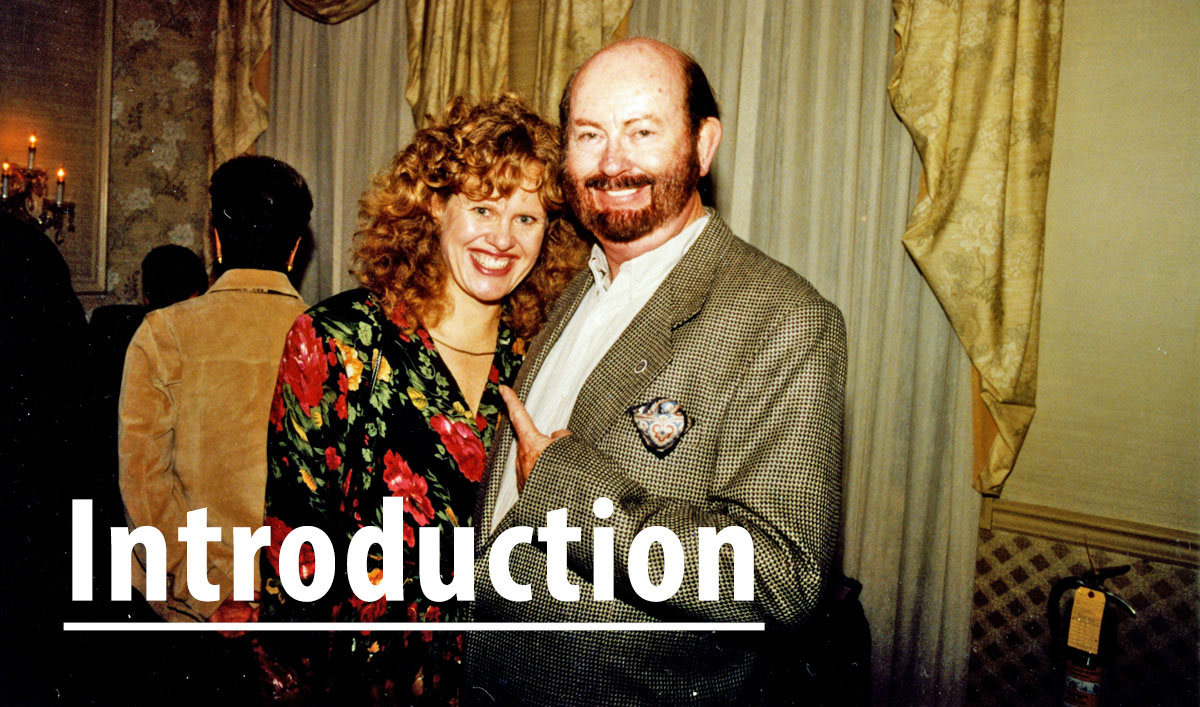
This story is true. Every incident that I relate is as I experienced it. The story, however, includes claims and promises made by my ex-husband, James Alwyn Montgomery, originally from Sydney, Australia. Although I accurately recount what he said to me, his statements may not be true.
That’s because, in my opinion, James Alwyn Montgomery is a pathological liar. A sociopath.
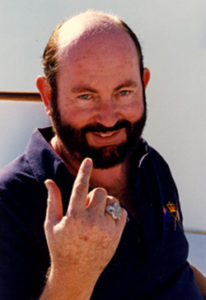
Most people do not know what the word “sociopath” means—hardened criminal? Deranged serial killer? These are cultural misconceptions, more Hollywood fiction than fact. In reality, sociopaths are social predators. Sometimes they commit serious crimes, but often they “only” cheat on romantic partners, assault their spouses, lie to family members, abuse drugs and alcohol, steal from employers, swindle investors and defraud credit card companies.
I use the word sociopath according to its original definition — as an umbrella term for all personality disorders in which the affected people exploit and manipulate others. It includes the current clinical diagnoses of antisocial, narcissistic, borderline, histrionic and psychopathic personality disorders.
Official estimates of the numbers of people who have these disorders vary, but the total averages around 12 percent of the population. In 2017, the adult population of the United States was more than 255 million. If 12 percent are disordered, that means we live among more than 30 million sociopaths.
Most sociopaths live freely among us, and not just in “bad” neighborhoods. Sociopaths roam all communities and all segments of society. They are male, female, rich, poor, all ages, all races, all religions, all education levels, all demographic groups. Their deceptive and manipulative behavior causes confusion and chaos wherever they go. Although the actions of sociopaths are immoral if not criminal, many are never arrested for anything. They may hold long-term careers in every imaginable field. They occupy many corner offices, although employees would probably describe them not as inspired leaders, but as ruthless, unethical bullies.
Anyone who becomes involved with a sociopath is likely to experience emotional, psychological, physical or financial
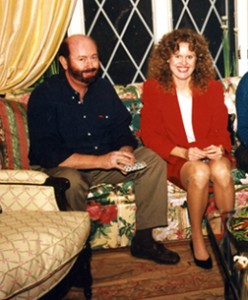
devastation—or all of the above. In this book, I tell what happened to me and other women that James Montgomery snagged—he was a prolific con artist.
But this is not only our story. The twisted, parasitic behavior James Montgomery exhibited, I have learned, is typical of a sociopath. Because of my website, Lovefraud.com, thousands of other victims of sociopaths have contacted me. Their stories sound a lot like mine.
Many victims are intelligent, caring and upstanding citizens, yet they were unwittingly sucked into devastating dramas. The statement I hear most often is, “I never knew such evil existed.” It does, and this book describes what the evil looks like.
The next thing I hear from Lovefraud readers is a question, “Why did this happen to me?”
I asked that question—emphatically, vehemently. I am an honest, forthright and competent person. I didn’t deserve to have my hopes and dreams crushed. I didn’t deserve to be humiliated. Yet it happened.
Seeking to find out why James Montgomery crashed through my life, I embarked on a journey that took me not only deep within myself, but into my relationship with God and the universe. So, intertwined with this story of betrayal is a parallel story of personal and spiritual growth.
My run-in with James Montgomery, it turned out, had a larger, divine purpose. The experience, in all its affliction, was lifetimes in the making and fulfilled my own spiritual plan.
I didn’t know this as it was happening. I didn’t know it as I poured my anguish and confusion into my journal, trying to fathom why, in my search for love and happiness, my life was torn to shreds. I prayed for answers and guidance from my higher self, God, anyone who was listening. Sometimes I vociferously demanded answers.
I got them—although they weren’t what I expected.
The complete and unabridged printed Love Fraud, autographed by Donna Andersen, is now available FREE! Just pay S&H.
Also ebooks for epub (iBooks) and Kindle. Visit the Lovefraud Bookstore.
Get this audio book FREE when you join Audible.
Ebooks, printed books and audio books are also available on Amazon.com.
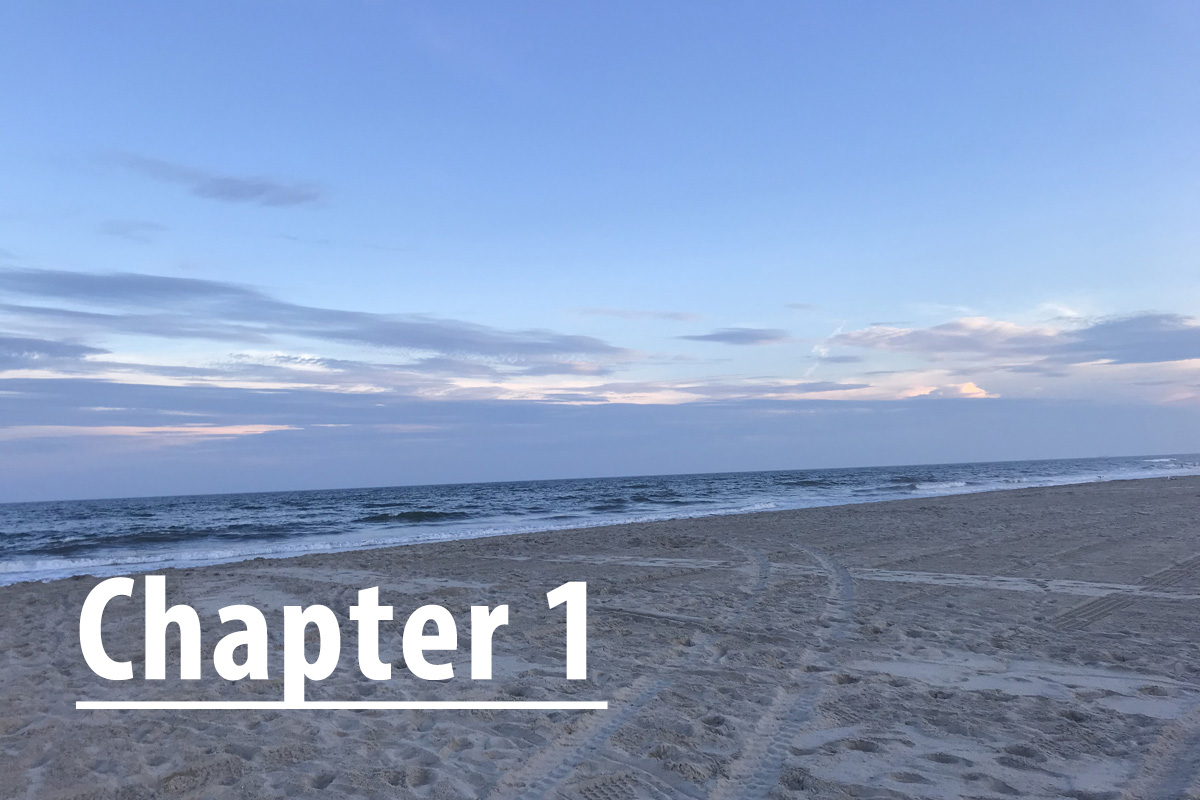
James Montgomery toasts his new bride, Donna Andersen
Reviews of Love Fraud – How marriage to a sociopath fulfilled my spiritual plan
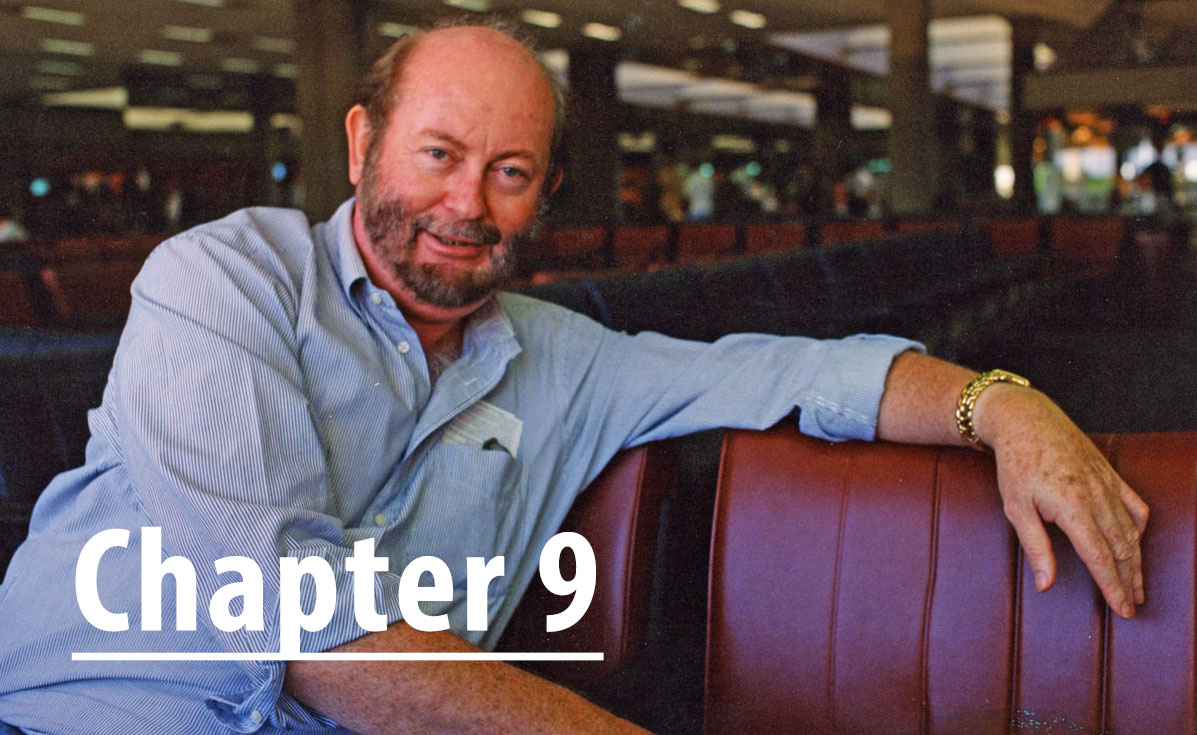
As soon as we returned from our honeymoon in Paris, James Montgomery plunged full speed ahead into his business plans. One evening in late January, James hosted a meeting in our dining room. Attending were Archie Turner, returned from visiting his family in England, Joe Nickles, Chic Attig and Pinky Kravitz, the local radio personality. Joe and Chic had been promised ownership interests in the factory that would make construction materials, which James was now calling the Polytechnique Group. I thought “Polytechnique” was stupid—it sounded like a school—but James decided that was the company name, end of discussion.
I did not participate in the meeting. I did, however, receive the reports James generated afterwards about his “JAG strategy.” The reports outlined his next steps: Develop programming concepts for the Jersey Shore Channel to present to Suburban Cable in February. Pitch CelebAM for the Atlantic City Convention Center in response to a request for proposal that he anticipated receiving in March. Secure funding to launch the construction materials company.
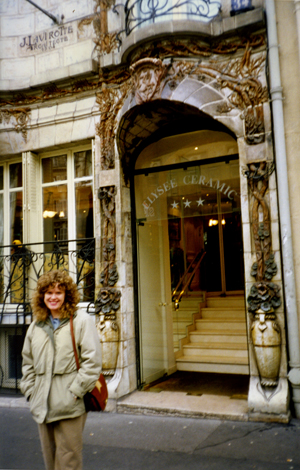
There were new items on the reports as well. James learned of an opportunity for themed construction materials at the Foxwoods casino in Connecticut, which could jumpstart Polytechnique. He came up with an idea to build a new attraction called “Century Park” at Atlantic City’s tiny Bader Field airport, which was expected to be decommissioned. It would feature six geodesic domes surrounded by themed entertainment. James also wanted to launch a television network called the Chance Channel—the first national gaming and casino network.
James was elated after the meeting and kept talking about it. “Everybody likes my strategy, Nuffles,” he said to me the next day as I was cleaning up the kitchen. “It’s really brilliant, you know, with each component supporting the others. One day I’m going to be famous. You just might be married to the next Walt Disney!”
“That’s great,” I replied, “but what I want right now is to get my credit cards paid off.”
Anger gathered on my husband’s face. “Donna, I am working day and night to try and make a life for you,” he spat, with barely controlled hostility. “The least you can do is be supportive.”
The hard edge in my husband’s voice stunned me. “James, I think I’m being plenty supportive,” I retorted. “I’m supporting you to the tune of about $50,000—and counting.”
“You knew what my plans were when you married me and you wanted to be part of them,” he shot back. “That’s what a marriage is, you know. Two people supporting each other. But you wouldn’t know that because you’re not normal. You’ve never been married before.”
That was a low blow.
“Look at you,” he continued. “Forty years old and you never got married. I can just imagine how people were wondering what was wrong with you.”
I couldn’t believe the cruelty of his words. In shock, I turned away and left the kitchen. I went upstairs, into the meditation room, and stood at the window overlooking the big locust tree in my backyard. James followed me into the room. He was still angry, and his presence felt physically menacing. He stood between me and the door, and I was afraid.
“Donna—” he began.
“Oh, don’t worry James,” I said, my heart and voice broken. “Do whatever you want. I’ll never stand up to you again.”
•••
Despite the pain I felt at my husband’s withering accusations, I didn’t go along with everything he wanted. The six-month option that he bought on Central Pier was about to expire, and he thought we should come up with another $20,000 to renew it. I was not interested in throwing good money after bad. Besides, we didn’t have any money.
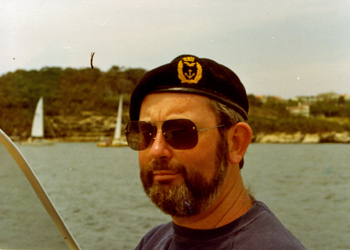
To bring in some short-term cash, James tried to peddle a movie script he had written about the Vietnam War called The First Casualty. The title reflected an adage that “truth is the first casualty of war.” The script told the story of a journalist covering the war who fell in love with a young Vietnamese woman, then was forced to become involved with the conflict, rather than just reporting it, as Saigon fell.
First, however, James needed an electronic version of the script. He said he only had a printout because his hard drive on a previous computer crashed, vaporizing the file. My sister, Tracy, and I were pressed into service to retype the manuscript—I took the first half and she took the second half.
“What do you think of it?” James asked me after I finished.
“I like it,” I answered. “But since you describe the woman as coming from a strict, traditional Vietnamese family, I think she falls in love with the journalist too quickly. It seems like there should be more courtship.”
“That’s a good point,” James said. “I did have more of that in there, but I cut it out because I thought the script was running too long.”
Suddenly, another scriptwriting opportunity appeared—one that was much more immediate. Tracy took a new job at an infomercial company in Media, Pennsylvania called Opus One. The company usually produced infomercials for golf products, but a new client wanted to market sunglasses on television. They needed a freelance infomercial script, and Tracy suggested James and me.
We traveled to Media to meet with Tracy and her boss. James brought Archie along, who had considerable television production experience. As James described his new television ventures during the meeting, I noticed that he implied they were much further along than they actually were. Still, he talked a good game, and Opus One retained us, agreeing to pay $4,000 for the script. I was relieved that James would actually earn some money, even if it wasn’t millions.
***
James told me he had a meeting in Florida with Disney to pitch his First Casualty script. I took him to the Atlantic City airport on February 26, 1997 and picked him up on March 2. Every morning at 6 a.m. he called to wake me up and tell me that he loved me. He also called a few more times each day and sent sexy e-mails.
Get this audio book FREE when you join Audible.
The infomercial script for Tracy’s company, in the meantime, was done. James wrote the video portion, in which actors raved about all the features and benefits of the sunglasses. I wrote the call to action—where the announcer says, “Call the number on the screen right now for your sunglasses, only three easy payments of $19.99!” It was my first infomercial and the script came out well.
But the show was never produced. Shortly after we turned in our script, Opus One collapsed. Tracy lost her job, and it did not look like we would be paid. So James turned our invoice over to a “piranha fish—”a collections attorney.
We wouldn’t see that $4,000 anytime soon, which added to the anxiety about our finances that consistently bubbled in my stomach. Plus, it was time to file taxes. I went downstairs to James’ office, where the lights were off and the television was on, and asked my husband how he wanted to proceed.
“I don’t file taxes,” he said.
“What do you mean, you don’t file taxes?”
“I haven’t filed taxes since I’ve been in this country. A lot of people don’t file taxes—that’s what loopholes are for. I don’t make the rules, I just use them.”
“That’s not right,” I said.
“You’re so naive,” James said, condescendingly. He must have seen the shock on my face. “But it’s part of your charm,” he quickly backpedaled.
Disconcerted, I went to my accountant and asked if I would liable for James not paying taxes. He said if problems arose, I might be able to claim the “innocent spouse” defense.
“That’s me,” I said. “I’m the innocent spouse.”
The best thing for me to do was to make my tax status “married, filing single,” and hope that the government was satisfied.
•••
My brother Doug’s birthday was in March, and on a Sunday afternoon his wife planned a small celebration in their home. James said he had to work, as usual, so I went alone. Toward the end of the party, Doug cornered me in the family room.
“You know, Donna, Dad is concerned about James,” he began.
“What’s he concerned about?”
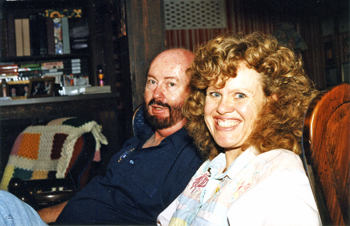
“He thinks James doesn’t have any money and you paid for the entire wedding.”
I froze inside. This was not a topic I was prepared to discuss.
“Well, things are tight right now until his projects come through,” I said. “But when they do, we’ll be fine.”
“Look, Donna, why don’t you let me check him out?”
“What do you mean?”
“I’ll run a credit check. We do it all the time when my company hires someone new. All I need is his social security number.”
If Doug did a credit check on James it would probably come back with problems. James had already told me he had no credit. But the entire family didn’t need to know that.
“I don’t think that will be necessary,” I said to Doug.
Shortly after that conversation, I left. But on the long drive back to Atlantic City, my stomach churned. What had I gotten myself into? James showered me with affection. He promised that we would soon be “living in the lap of luxury.”
He continued to make calls and go to meetings to pitch his plans. He recruited people besides me to become part of those plans. He wasn’t at all worried. But I was working my butt off, and everything I earned was consumed by his spending. We were in debt—or more precisely, I was in debt. More debt than I ever had in my life.
I remembered a brief conversation James and I had a month earlier.
“The debts are yours,” I’d griped at him. “You’re the one spending all the money.”
“That doesn’t matter,” he replied. “We’re married. My debts are your debts.”
The statement—and the callous tone of his voice—horrified me. I thought about those words as I was driving. The implications were not good.
When I got home almost two hours later, I was angry and upset. I didn’t really want to talk to James, so I went directly upstairs. I was in our bedroom when I heard my husband coming up the steps.
“When did you get home?” he asked, standing in the doorway.
“A few minutes ago,” I said, without looking at him. I busied myself smoothing out the bedspread.
“You have to take me to the airport on Friday,” James said. “I’m going to South Carolina to see the Lewises and then to Florida.”
“Why are you going to Florida?”
“I have another meeting with the company in Sanford about working with TPG.” That was the Polytechnique Group.
“How much is that going to cost?” I asked.
“Not much. I got a $100 plane ticket on Spirit and I’ll be staying at a Days Inn.”
At this point James noticed that I still hadn’t looked at him and my voice was strained. “What’s wrong?” he asked me.
Finally, I looked up. “Well, James, today Doug asked me for your social security number. He wants to run a credit check on you.”
James didn’t say anything.
“I told him that I didn’t want him to do a check,” I continued. “But if my family knew what was really going on they would have you out of here immediately.” My tone and expression clearly communicated that I thought our problems were James’ fault.
James took a few steps into the room. When he spoke, his voice was pained. “Donna, I know this isn’t what you expected. It isn’t what I expected either. I’m pushing as hard as I can. Everything is just taking a lot longer than I thought it would.”
I sat on the edge of the bed, partially turning my back towards him.
“Do you want me to leave?”
I looked up. There were tears in his eyes.
“I don’t want you to hate me,” he continued. “I made a promise to myself—if it ever gets to the point that you hate me, I will leave.”
I was in turmoil. I married this man. I made a commitment to stand by him, boots and all. That was the point of marriage—commitment. He was trying, but the plans weren’t working out as quickly as he expected. What was I supposed to do? What kind of wife gets rid of her husband because his business plans aren’t working out?
Get this audio book FREE when you join Audible.
“Everything I’m doing is for you,” he continued, as a tear slid down his cheek. “But if you want me to leave, I will.”
I was quiet for a moment. Then I said, “No, James, we’ll keep going.”
James pulled me to my feet and put his arms around me. “I need you to believe in me,” he said.
•••
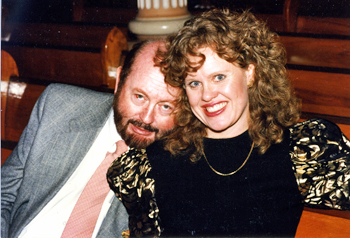
My younger brother, Greg, was getting married on April 4, 1997. It was the second Andersen wedding of the year. James refused to go.
“James, you’re my husband,” I said. “This is an important family event. You should be there.”
“Your family thinks I’m taking your money,” he retorted. “Why would I want to associate with them?”
I didn’t answer.
“Doug wants to run a credit check on me,” he continued. “Do you know what that is? It’s called tortious interference with marital relations. In some places you can sue for it.”
“They’re just concerned about me.”
“You’re an adult. You made a decision to marry me. They have no business trying to second-guess your decision.”
I was torn. James was right—I had made the decision to marry him. But my family was also right—I was paying our expenses. Although I wanted to believe James was working towards our financial stability, so far he was costing me money. A lot of money.
And here I was, a married woman, and I still couldn’t get a date for a family wedding.
“James, will you please go with me?” I asked.
He was quiet for a few seconds.
“Donna, you know that I love you, and I want you to be happy,” he said, in a conciliatory tone. “So I’ll go with you to the church. But I won’t go to the reception.”
The day of the wedding, we prepared to drive up to the most northern part of the Jersey Shore—in two cars. I wore one of the cocktail dresses that had belonged to Gale Lewis. It was a fitted sheath of black wool knit with black and gold balloon sleeves. The dress was a bit warm for April, but it was dramatic enough for the sister of the groom, and it was free.
“Are you sure you won’t stay for the reception?” I asked James.
“No. I’m going to sit in the back of the church, and when the ceremony is over, I’ll leave.”
I was doing a reading during the wedding ceremony, so I would be in one of the first pews.
“James, I need you to sit with me in the front. If you’re not going to do that, you might as well stay home.”
James did sit with me during the wedding. Then I went, alone, to the reception. It was a wonderful party. Greg and his new wife, Trish, were friendly with a rock band that played area clubs, and that’s who they hired for the reception. Their friends were young, so there was a lot of group dancing that I could comfortably join without a partner. For a few of the ballroom-style songs, Dad came over and asked me to dance.
•••
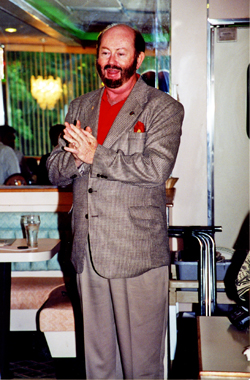
James was traveling again on April 17, 1997—he told me he had a meeting in Los Angeles with studio executives about his First Casualty script. The next morning he called to wake me up, as he always did when he was out of town. “I’ve been invited to fly to the Bahamas for the Nassau Film Festival,” James told me. “They’re honoring Australian filmmakers, and they’re going to give me an award.”
“No kidding!”
“Geoffrey Rush will be there—they want me to talk to him about The First Casualty.”
I knew of Geoffrey Rush—he was the Australian actor who had just won an Academy Award. I hoped that meant they were serious about James’ script.
“That sounds great!” I said.
“I’ve got to go—I’m flying with them on a private jet. I’ll call you tomorrow.”
“Okay. I love you,” I said to James.
“I love you more,” he replied.
When James returned a few days later, he reported that the film festival was a joke. “Look at this stupid award they gave me,” he said. “It looks like a bowling trophy!”
The award had a small marble base, a red and gold-tone column about eight inches tall, and a gold-tone laurel wreath on top. It did look like a bowling trophy, and a short one at that. I had nicer trophies from my softball days.
At least James liked the Queen Elizabeth II commemorative plate that he also received. “Everyone wanted the plates,” James said, “but only a few of us got them.”
“Did you talk to Geoffrey Rush?” I asked.
“Yes, although he hadn’t yet seen the script,” James answered. “So I gave him the basics of the story and how he could play it. I think he is interested.”
The festival may have been a waste of time, but at least James had a chance to visit the Atlantis on Paradise Island. The resort and casino was heavily themed to look like an ancient nautical world that was lost in time. James shot three rolls of film—it was exactly the type of work that Polytechnique would do.
A few days after he returned, James showed me a fax he received from Ricardo Mestres, president of Hollywood Pictures, which was a division of Walt Disney Pictures. A Mickey Mouse logo was at the top of the fax.
To: James Montgomery
From: Ricardo Mestres
Date: Friday, April 25,1997
Re: Our Thanks for NassauJames,
Michael Eisner and Dick Cook asked me to thank you again for your help with the Film Festival in Nassau and I understand you have agreed to return in 98 as a presenter with your wife, Donna.
It looked as if you hit it off with your compatriot Geoffrey, as he certainly had some compliments for you when he flew back to LA with Michael. I am sorry that my people hadn’t got a copy of First Casualty to him before your meeting. However, Jody said you did a great job of selling him and it was probably to our mutual advantage that he didn’t read it cold.
Business Affairs has been given the tape of your conversation on production with Jody and Tim on Saturday morning. I do hope you can clear your desk to produce this. Michael felt that Geoffrey was hinting that it would be a precondition to his becoming attached. Your comments on directors were passed on to Dick Cook. I know they are still talking with Mel Gibson’s agent.
Jody told me your summary page on production is due here by tonight and we are scheduled to discuss The First Casualty at our Tuesday pre-production-in-progress meeting. Geoffrey is going into post in Orlando for most of May and it may be possible to schedule a script conference with him, yourself, Jody and Tim in the next couple of weeks and get this on our production schedule. Michael asked for Nung’s Mermaid on Friday, our Mr. Rush must have raised it!
I will be talking to you in the middle of next week.
Take Care Mate!
Ricardo
The letter gave me hope. James was being considered to produce The First Casualty, and Disney was also interested in his script called Nung’s Mermaid, about a 12-year-old Vietnamese boat refugee trying to save an endangered manatee. This was really good news.
•••
For the first time in more than a year, and for the first time since I met James, I had a session with Elaine Anderson, my energy therapist, on May 8, 1997. I told her about my new husband. I met and quickly married a man 15 years older than me. (Even when he said he was 51, he lied. He was actually 55.) James’ background was advertising, marketing and television, and now he was an entrepreneur with big ideas for theme parks and construction companies—but no deals. Our finances were a disaster; I was paying our household expenses, his business expenses and carrying far too much debt. I was severely stressed.
As always, Elaine listened quietly, without judgment.
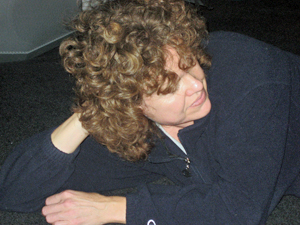
James tried to reassure me, saying everything he was doing was for me. I told Elaine that James was confident his plans would work out—they were just taking longer than he anticipated, which he apologized for. He kept telling me that his efforts—and my support—would pay off, and eventually his dreams would come true and we’d have more money than we would know what to do with. But I was worried about how long it would take. I resented carrying the financial burden, and I was afraid of all the debt on my credit cards.
According to the Star+Gate cards, improvement would take time. The issue at the moment, the cards said, was “Aspiration,” and my new focus was “Patience.” The two cards indicating what lay ahead of me were “Hope” and “Lover.” Elaine and I interpreted the cards to mean that realizing our dreams and aspirations would require patience. Patience was not one of my strong points.
So we worked to relieve my stress energetically. I lay on Elaine’s massage table with the nine crystals arranged in a straight line below it. Elaine asked for Guidance to assist us, and before long, I felt fear. But it was not only my fear, it was the fear of my mother, who never knew economic security in her marriage.
My mother’s contributions were critical to the family’s finances—as soon as she got her paycheck every Friday, she spent it on groceries. Then I felt my own fear—the fear of repeating her experience.
I focused on releasing the fear and pain. As the negative energy dissipated, Elaine and I felt the presence of my husband. James had stayed with me during a difficult period of adjustment. He felt my fear, and although he wasn’t supporting me financially, he tried to show support in other ways—through affection and our physical encounters.
In the past, I couldn’t always feel the love that my family and friends felt for me. But that day, on Elaine’s table, I felt my husband’s love.
When I got home I told James that I had talked to Elaine about my fears. I also told him that I felt his energy and love. It must have struck a chord, because a few days later he wrote for me another romantic memoir of our honeymoon in Paris:
Outside, a dark and drizzly day finishes in Atlantic City, but inside, it is a crisp January evening in Paris. I am walking under the plane trees by the Seine, just after a concert of classical music at a tiny, stony, centuries-old church I had serendipitously stumbled upon a few hours before. I am with my wife of a few days but I am not faithful, because I am drunkenly in love with the river, the trees, the party boats that spotlight the elegant facades that line the bank—I am in love with the city, and wherever I go, it is there.
I walk down a tiny alley past galleries and antique shops and bookstores to a place I know, an eight-table restaurant with real sawdust on the floor and waxy wine bottles bearing candles on white paper tablecloths and the best sausages and French fries in town.There is real romance here, too. Lovers sit at the corner tables, their arms intertwined, staring deeply into each others lives.
I think of Baudelaire and Hemingway, of the blonde I married the week before with the heart-plucking laugh and the Cote d’ Azur eyes. I sigh.“It is good,” I write in my Toshiba,“to be alive.”
So many years, so many memories— Again the scene shifts, and now I am at Shakespeare and Company, talking with the irascible, irreplaceable George Whitman about Lawrence Ferlinghetti and Sylvia Beach and James Joyce, about the writers and pilgrims who still sweep through, looking for inspiration, camaraderie or just a cheap place to stay. I wander into one of the weekly salons, held up a cramped staircase in a book-lined, third-floor room, and listen to a wispy poet read his latest works to coal-eyed women and chain-smoking men.
And I returned to the hell of the Paris of the Orient. It was 1968’s Paris.
What is it about Paris that I fell in love with, that so many people fall in love with? Partly it’s the sheer beauty of the place, the quirky cobblestone neighborhoods and the grand boulevards lined by elegant immensities of symmetrical stone. Partly its the rich history that seems still to infuse the air—the bells pealing from Notre Dame as they have for centuries, the medieval tapestries enlivening Musée de Cluny, the sacrifices commemorated at the Arc de Triomphe. Partly it’s the omnipresence of art and culture—the museums and the theaters, the gardens and the galleries. And partly it’s the bistros and the boutiques, the cafes and the theatrical life of the streets.
But its something else, too, something ineffably romantic about the city: the way the light filters through the trees and reflects off the Seine; the way the leaves glisten on the pavement after a winter rain and the smell of them filling the metro stairway as you ascend to the street; the echo of a flute in an arch at the Louvre; the sudden swish of a child’s sailboat at a fountain at the Tuileries; the way the city glimmers at night, a metropolitan Milky Way—oh, City of Light.
It is also where my Donna fell deeply in love and we were both 21 again. Isn’t this true of many cities? Well, somehow not. There’s something about Paris that makes people walk hand in hand and stop to kiss long and deep, and sigh, oblivious to all the people passing by. Remember? And so I take memory by the hand, walk a little way, and stop: The air is crackly crisp, a breeze rustles the plane leaves, the moon slivers and shimmers on the Seine. “Everything is possible,” memory whispers in my ear. I close my eyes, and we are that young again.
May 13, 1997
•••
Ten wrapped boxes, all for James, were stacked on the dining room table the morning of June 15, 1997—Father’s Day. Each box held one of our wedding pictures in a distinctive frame. I worked on the gift for weeks—ordering the pictures, selecting the frames, trimming the photos to fit the frames, wrapping all the boxes.
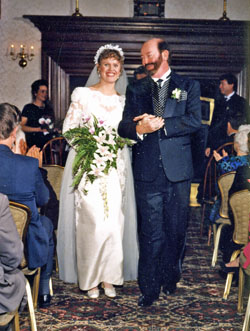
Sometimes James acted like a big kid, especially around “presies.” That morning he made a fuss over each box, dramatically tearing off the paper, commenting about each photo — “Another beautiful picture of me and my Darwies,” then standing the framed photo up on the table.
After opening the presents, James took me in his arms. “Thank you for all the presies,” he said.
“Happy Father’s Day,” I said to him. “I love you.”
“I love you more,” James replied.
We settled down to eat breakfast and read the Sunday paper. In honor of Father’s Day, the Press of Atlantic City ran a special feature called Father knows best—a tribute to dads on their day. Earlier, the newspaper had invited readers to share their fathers’ favorites expressions.
My dad had dozens of them, which we’d heard since we were children. At dinner, he’d tell us to “fill up on bread.” If we were struggling to build something, he’d say, “Whaddya making, a piano?” If we were slow, he’d say, “Snooze and you lose.” Then, just for effect, he’d say, “I’m never wrong. I thought I was wrong once, but I was mistaken.” We called the sayings “Allanisms.”
I sent a list of “Allanisms” to the newspaper. That morning I searched the Press to see if any were printed, and they were. “Look, James,” I said excitedly, showing him the article. “They printed a bunch of my dad’s Allanisms!”
James looked at the story:
“Early to bed, early to rise, makes a man early.”
“Pick up everything that’s not green or nailed down.”
“High blood pressure is better than no blood pressure.”
“Quicker than the last Mass at a summer resort.”
“A short pencil is better than a long memory.”
“Do you think the rain will hurt the rhubarb? Not if its in cans.”—Allan Andersen, Vineland, submitted by Donna Andersen, Atlantic City.
He finished reading and gave me a disapproving look. “What’s the matter, don’t you want people to know we are married?” he asked.
I was astounded. “What are you talking about?”
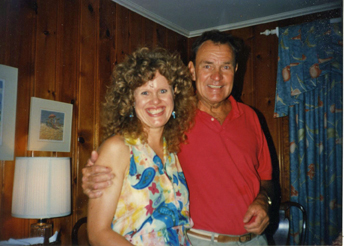
“You gave your name as Andersen, not Montgomery.”
“My name is Andersen.”
“Don’t you think, if you’re going to be in the newspaper, it would be a good idea to give your husband some publicity? Or do you want to keep the fact that we’re married a secret?”
His criticism rattled me. On the one hand, I thought it was stupid. I wasn’t trying to hide my marriage—I just gave him 10 framed wedding photos for Father’s Day—and my name was Andersen. On the other hand, it never occurred to me to submit my name as “Montgomery,” and I felt guilty. I resolved that the next time I was interviewed, I’d identify myself as “Donna Andersen Montgomery— if nothing else, it would avoid another confrontation.
•••
James studied the newspaper travel section on Sunday, June 29, 1997, as we ate lunch in the dining room. “I think we should get away together,” he said.
“That’s a nice idea,” I replied, “but we can’t afford it.”
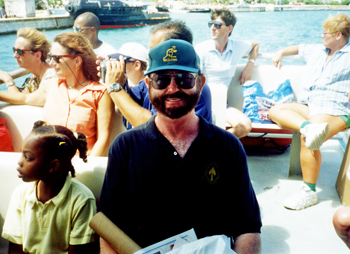
“Sure we can,” he said. “Look at all these package deals. If we go to the islands, it’s the off-season, and it’s really cheap.” James pushed the newspaper in front of me, open to travel agency ads. They offered airfare plus three to five nights of accommodations for less than $1,000 per person.
Maybe a getaway would be good for us.
“I like Bermuda,” I said. “Once I stayed at a place with an efficiency kitchen. Maybe if we get a place with a kitchen, we can save money on food.”
James was hot on the idea, and within an hour, we were at the travel agency in the mall. I told the agent I wanted a place with an efficiency kitchen. She told us about several hotels in Bermuda. One was the Palmetto Bay Hotel, located on Harrington Sound. “They have cottages with views of the sound,” she said. “You can go snorkeling there.”
“That sounds good,” I said. “I like snorkeling.”
The dates that we wanted at the end of July were available. Airfare and four nights of accommodations totaled $1,700.
“Done,” James said.
Time elapsed from James’ initial suggestion to a confirmed trip to Bermuda: two hours.
•••
July 14, 1997 arrived—James’ birthday. It would have been nice to buy my husband an expensive new watch for his collection, but I couldn’t afford it. So I went to Burger King. Anyone who bought a Burger King meal could also buy a watch based on one of the big movies of the summer, The Lost World: Jurassic Park. I got the Dino Eye version, which had a plastic band that looked like dinosaur skin and an orange glint to the watch face. It might not be the Patek Philippe that James wanted, but it was a clever novelty.
I got the idea from James. When he went away on a business trip, he usually returned with a gift for me, like a t-shirt. But after one trip, he came up to my office with his hands behind his back.
“You know I’m always thinking of my Mouse,” he said, rocking back and forth on his heels. “I wish I could always buy you nice presies, but I can’t yet, so I got you this.” James opened his hand, in which he had an unopened, 2.25-ounce bottle of Heinz ketchup that came with his hotel breakfast. “It’s to remind you that your husband loves you, and one day he’ll get you real presies.” I set the ketchup bottle in a place of honor on my computer, where it was always in view as I worked.
We had an intimate celebration for James’ birthday. The next day, however, was bill paying day. Regardless of the message of the ketchup bottle, as I opened the bills, I became more and more upset. The emotion was more than I could contain. I strode down to James’ office with a fistful of bills. He was sitting behind his desk, leaning back in his executive chair, talking on the phone. I stood there watching him while he finished his conversation. He hung up and looked at me expectantly.
“James, our phone bills for last month added up to $900.”
“So?”
“Well James, that’s a lot of money.”
“It’s a necessary expense.”
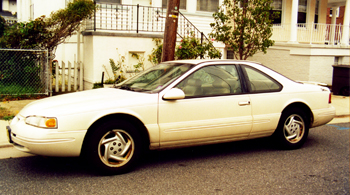
“The auto insurance company just raised our rate by $800—because of your speeding ticket.”
“I don’t have a speeding ticket.”
“It’s listed right here on the bill.”
“I am an expert driver,” James insisted. “I don’t have a speeding ticket.”
His denial astounded me. “James, I am really tired of the bullshit. When are you going to bring in some money?”
“You know how hard I’m working,” he said.
“No, I don’t, James. I know that you run up the phone bills. I know that you’re always ready to jump on an airplane. I don’t know if you’re working.”
“Look at the conditions I have to deal with,” he countered, waving his arm to encompass his office. “I’m down here in a dark cellar trying to get several multimillion dollar businesses going. This is disgraceful. But I keep going. I don’t complain. So I don’t know why you’re upset. Nothing has changed.”
“I’m upset because our financial situation is terrible,” I said, my voice rising. “We are more than $37,000 in debt.”
“We are $37,000 in debt today, we were $37,000 in debt yesterday. What’s the difference?”
“The difference is I don’t see any improvement and I’m getting tired of it.”
“What about Polytechnique? We just met with Caesars and have an opportunity to bid the job.”
“Yeah—our non-existent company, depending on a supplier that I don’t know.”
“I know them. You don’t need to know them.”
“Why not? I’m the president of the company.”
“That’s only a title and you know it. You’re not responsible for the business. I am.”
“Well, the reason we have the Caesars opportunity is because I found it. I followed up and I got the appointment. And I’m the one studying the drawings.”
“I don’t know why you’re wasting your time with that. It’s the fabricator’s job.”
“And what happens if the fabricator has questions? Or the client has questions?”
“You don’t need to worry about that.”
“Well, since there’s nothing for me to do, how about if I resign?”
“Do what you want.”
I stared at James, unable to comprehend his cavalier attitude. I turned and left. Somehow, I went back to my office and wrote the checks to pay the bills. Nothing had been resolved, and I felt more stressed than ever. I’d recently recorded my feelings in my journal, writing to James what I was afraid to say in person:
Who do you think you are—running around pursuing your grandiose dreams while I m stuck with my nose to the grindstone, paying the rent? I am so angry. I hate it. I hate you for making me work so hard. I am tired of carrying the burden. I want to work less, not more. I really don’t give a shit about your dreams. I just want the pressure off of me. I want to take days off. I want to coast. I want to relax. I don’t want to have to work so hard. I really hate it.
That evening, I lay on the floor in the spare bedroom, my meditation room, in the dark. I wanted to calm down, get centered and ask for spiritual assistance. What should I do about Polytechnique? Should I seriously quit the company? Should I put my decision into writing?
I heard a message from Guidance:
Be patient—things are coming to a head—yes, it has been long, but you chose the experience—you did need to learn to think of someone else, give to someone else. All your ideas of helping men were manipulative—this is the real thing. And now you don’t want it? You feel betrayed—yes, he did lead you on, but in his mind it was the truth. He was presenting the truth of his past experience—he did not know that the next experience would be the opposite. It was a lesson for him as well. He, too, is not accustomed to considering someone else in his plans. A lesson for you both.
It will soon get better, but still it will take time. Another year of financial recovery.
This was not a message that I wanted to hear.
James walked by, on his way to the bathroom. “What are you doing?” he asked.
“I’m trying to calm down.”
“Yeah,” he replied. “I think it’s the beginning of the end.”
•••
After predicting the imminent end of our marriage, James behaved as if the words were never spoken and everything was fine. He took out the trash as always, feigning pride in being the garbage collector. He brought in the mail, as he did every day. He joked about being relegated to eating low-cost, generic cereal. He wanted to go to the movies.
A small theater was located less than five minutes away from us in Ventnor. Men in Black was another hit movie of the summer, and on a Sunday afternoon, we went to see it. As we were leaving our house, I noticed that James had left his new bicycle in the side yard, easily visible from the street. I got a quick intuitive flash to move the bike, but did nothing.
Men in Black, starring Tommy Lee Jones and Will Smith, was billed as a “science fiction comedy action film,” and it was. The script was original, the dialog was clever, the special effects were convincing and there was even a profound message at the end. We both enjoyed it thoroughly. “Men in Black is a totally new direction in filmmaking,” James enthused. “It’s going to change the way movies are made.”
When we arrived home after the 98-minute film, our gate was open and James’ bike was gone.
“I knew it,” I said. “I knew it was going to be stolen.”
Get this audio book FREE when you join Audible.
“Then why didn’t you say something?” James asked.
I had no answer. We filed a police report, but not expecting to recover the bike, James wanted to replace it immediately. So we bought exactly the same bike again, along with another radio, bike computer, rack, seat bag and mirror. This time James also wanted a tool kit. The store gave us 10 percent off because the original bike, less than two months old, had been stolen, but it still cost $449.
I resolved to listen to my intuition more closely, hoping it would guide me to make good decisions.
***
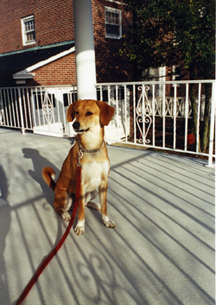
Our menagerie needed to be fed while we were in Bermuda. Dad was always happy to take Beau, and the day before we were to leave, I drove my dog to Dad’s summer place outside of Sea Isle City, New Jersey. It was a mobile home in a resort park, but we called it by its less glamorous name—the trailer. Behind it was a forest of scrubby oak and pine trees. Beau liked the woods—it was full of tantalizing scents and critters. He also liked visiting Dad, where every meal meant tasty handouts for the dog.
I sat on the screened-in porch drinking a soda while Dad gave Beau the first of the handouts. Knowing that Dad had negative feelings about my husband, I tried to burnish James’ image.
“Dad, did you know that James won the Victoria Cross? It’s the Australian equivalent of the Congressional Medal of Honor.”
My father continued to play with Beau. Without looking at me, he replied, “I don’t think James was ever in the army.”
I was shocked. Without a word, I set down my soda, got up and left.
The complete and unabridged printed Love Fraud, autographed by Donna Andersen, is now available FREE! Just pay S&H.
Also ebooks for epub (iBooks) and Kindle. Visit the Lovefraud Bookstore.
Get this audio book FREE when you join Audible.
Ebooks, printed books and audio books are also available on Amazon.com.
Love Fraud — How marriage to a sociopath fulfilled my spiritual plan: Interpreting the story
The complete and unabridged printed Love Fraud, autographed by Donna Andersen, is now available FREE! Just pay S&H.
Also ebooks for epub (iBooks) and Kindle. Visit the Lovefraud Bookstore.
Get this audio book FREE when you join Audible.
Ebooks, printed books and audio books are also available on Amazon.com.

